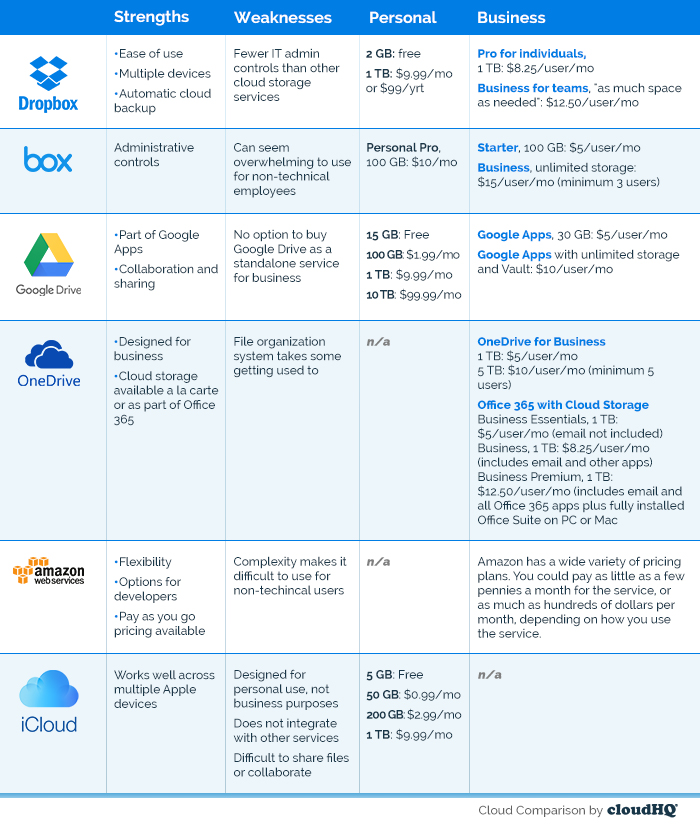Choosing the Right Cloud Storage: A Comparison Guide
Choosing the Right Cloud Storage Provider: A Comprehensive Comparison
In today’s digital age, data is king. Whether you’re an individual managing personal photos and documents or a large enterprise safeguarding sensitive information, the need for reliable and accessible storage is paramount. Cloud storage has become the go-to solution for many, offering convenience, scalability, and often, cost savings compared to traditional on-premise solutions. However, with so many cloud storage providers vying for your attention, choosing the right one can feel overwhelming.
This post aims to cut through the noise and provide a detailed comparison of some leading cloud storage providers, analyzing their features, pricing structures, security protocols, and suitability for various user types – from individual consumers to small businesses and large enterprises. We’ll explore several popular options including Google Drive, Dropbox, Microsoft OneDrive, Amazon S3, and iCloud, highlighting their strengths and weaknesses.
Understanding Cloud Storage Basics
Before diving into the comparisons, let’s briefly define what cloud storage is. Essentially, it involves storing your data on a network of remote servers instead of directly on your computer or local device. This offers several advantages:
- Accessibility: Access your files from anywhere with an internet connection.
- Scalability: Easily increase or decrease storage capacity as needed.
- Collaboration: Share and collaborate on documents with others in real-time.
- Data Redundancy & Disaster Recovery: Your data is typically replicated across multiple servers, minimizing the risk of loss due to hardware failure or natural disasters.
Comparing Top Cloud Storage Providers
Now, let’s examine some popular providers in detail:
Google Drive
- Features: Tight integration with Google Workspace (Docs, Sheets, Slides), generous free storage tier (15GB shared across Google services), real-time collaboration features.
- Pricing: Offers various tiers of paid storage plans, starting at around $1.99/month for 100 GB. Google One subscriptions bundle storage with other benefits.
- Security: Uses industry-standard encryption both in transit and at rest. Two-factor authentication is supported to enhance account security. Google employs rigorous physical security measures at its data centers.
- Ideal For: Individuals and small businesses already invested in the Google ecosystem, those prioritizing collaboration on documents, users needing a large free storage tier.
Dropbox
- Features: Known for its ease of use, reliable syncing capabilities, and extensive third-party integrations. Dropbox Paper offers collaborative document editing.
- Pricing: Offers a limited free plan (2GB). Paid plans start around $11.99/month for 2TB of storage. Business plans offer additional features like advanced admin controls.
- Security: Employs 256-bit AES encryption and supports two-factor authentication. Dropbox has a robust security team monitoring its systems.
- Ideal For: Users prioritizing ease of use, reliable file syncing across devices, and those needing integrations with various applications.
Microsoft OneDrive
- Features: Seamless integration with Microsoft Office suite (Word, Excel, PowerPoint), good for Windows users. Offers personal vaults for sensitive files.
- Pricing: Offers a limited free plan (5GB). Paid plans start around $1.99/month for 100 GB. Bundled with many versions of Windows and Microsoft 365 subscriptions.
- Security: Uses AES encryption and supports two-factor authentication. Integrated with Microsoft’s broader security infrastructure.
- Ideal For: Windows users, those heavily utilizing the Microsoft Office suite, individuals seeking a cost-effective storage solution bundled with their operating system or productivity software.
Amazon S3 (Simple Storage Service)
- Features: Highly scalable and durable object storage designed for developers and businesses. Offers various storage classes optimized for different access patterns (e.g., frequent access, infrequent access, archival). Integrates with other AWS services.
- Pricing: Pay-as-you-go pricing based on storage used, data transfer, and requests made. Can be very cost-effective for large volumes of data, but requires careful configuration to avoid unexpected costs.
- Security: Offers granular access control policies, encryption options (SSE, KMS), and integration with AWS Identity and Access Management (IAM).
- Ideal For: Developers, businesses needing highly scalable and durable storage for large datasets, those already using the Amazon Web Services ecosystem. Requires more technical expertise to configure and manage compared to consumer-focused services.
iCloud Drive
- Features: Tightly integrated with Apple devices (iPhone, iPad, Mac), seamless syncing across Apple ecosystems, collaboration features through Pages, Numbers, and Keynote.
- Pricing: Offers 5GB free. Paid plans start at $0.99/month for 50GB.
- Security: Utilizes encryption in transit and at rest. Two-factor authentication is available.
- Ideal For: Individuals deeply invested in the Apple ecosystem, those prioritizing seamless integration with their Apple devices.
A Comparison Table
Here’s a quick summary of the key differences:

| Provider | Free Storage | Starting Price (Monthly) | Encryption | Ideal For |
|---|---|---|---|---|
| Google Drive | 15 GB | $1.99 (100GB) | AES-256 | Collaboration, Google Users |
| Dropbox | 2 GB | $11.99 (2TB) | AES-256 | Ease of Use, Syncing |
| Microsoft OneDrive | 5 GB | $1.99 (100GB) | AES-256 | Windows Users, Microsoft Office |
| Amazon S3 | N/A (Pay-as-you-go) | Varies, potentially very low for small usage | SSE, KMS | Developers, Large Datasets |
| iCloud Drive | 5 GB | $0.99 (50GB) | AES-256 | Apple Ecosystem Users |
Security Considerations
Encryption: Most providers offer encryption both in transit and at rest, protecting your data from unauthorized access.
Two-Factor Authentication (2FA): Enabling 2FA is crucial for adding an extra layer of security to your account. It requires a code generated by your phone in addition to your password.
Access Controls: Carefully manage the permissions you grant to shared folders and files.
Conclusion
Choosing the best cloud storage provider depends on your individual needs and priorities. Consider factors like storage capacity, pricing, ease of use, integration with existing tools, and security features. Whether you’re a casual user or a large enterprise, there’s a cloud storage solution out there to meet your requirements. Don’t hesitate to take advantage of free trials or limited free tiers offered by providers to test their services before committing to a paid plan.
Remember: Regularly back up your data to multiple locations – including offline backups – as part of a comprehensive data protection strategy.



